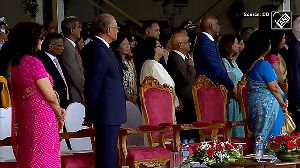Former Bharatiya Janata Party ideologue K N Govindacharya on Saturday denied praising Madhya Pradesh Chief Minister Digvijay Singh during a tête-à-tête with the correspondent of a national news agency in Jabalpur on Friday.
Govindacharya told a hurriedly convened press conference in New Delhi on returning from Jabalpur that he was shocked to read reports in several daily newspapers that he had praised the Congress strongman's track record in governance. "None of the statements attributed to me were accurate," he said.
But Govindacharya also gave ample hints, though cautiously, of his disenchantment with the ruling National Democratic Alliance led by the BJP. "The dynamics of power politics has taken its toll," he remarked.
Govindacharya, who had taken a two-year sabbatical to study the impact of globalization on the economy, said he disliked the government's approach to divestment in public-sector units, but stressed that he would agitate "against the hegemonistic attitude of the WTO against the interests of the poor countries".
Since the World Trade Organisation is scheduled to meet again in Mexico in September, a rally of eminent persons has been scheduled for September 2 in New Delhi to mount pressure on the government not to surrender to any anti-poor decisions at the WTO.
Govindacharya said he had completed his report on the impact of globalization, especially with regard to WTO issues, and he would submit it to the government. "The aspirations of the people are not being fulfilled," he said. "For that, what is needed is dharma satya, samaj satya, arth satya, and rajya satya."
He said he stands by his decision to keep away from politics and not renew his primary membership of the BJP. He said he had taken study leave on September 9, 2000, and completed his report in January 2003.
Referring to the developments in Iraq, Govindacharya said might rules in international affairs. He asserted that the invasion of Iraq was a gross violation of the United Nations Charter. "Saddam Hussein's dictatorial regime cannot be legitimised," he said, "but that cannot also justify the US action."






 © 2025
© 2025